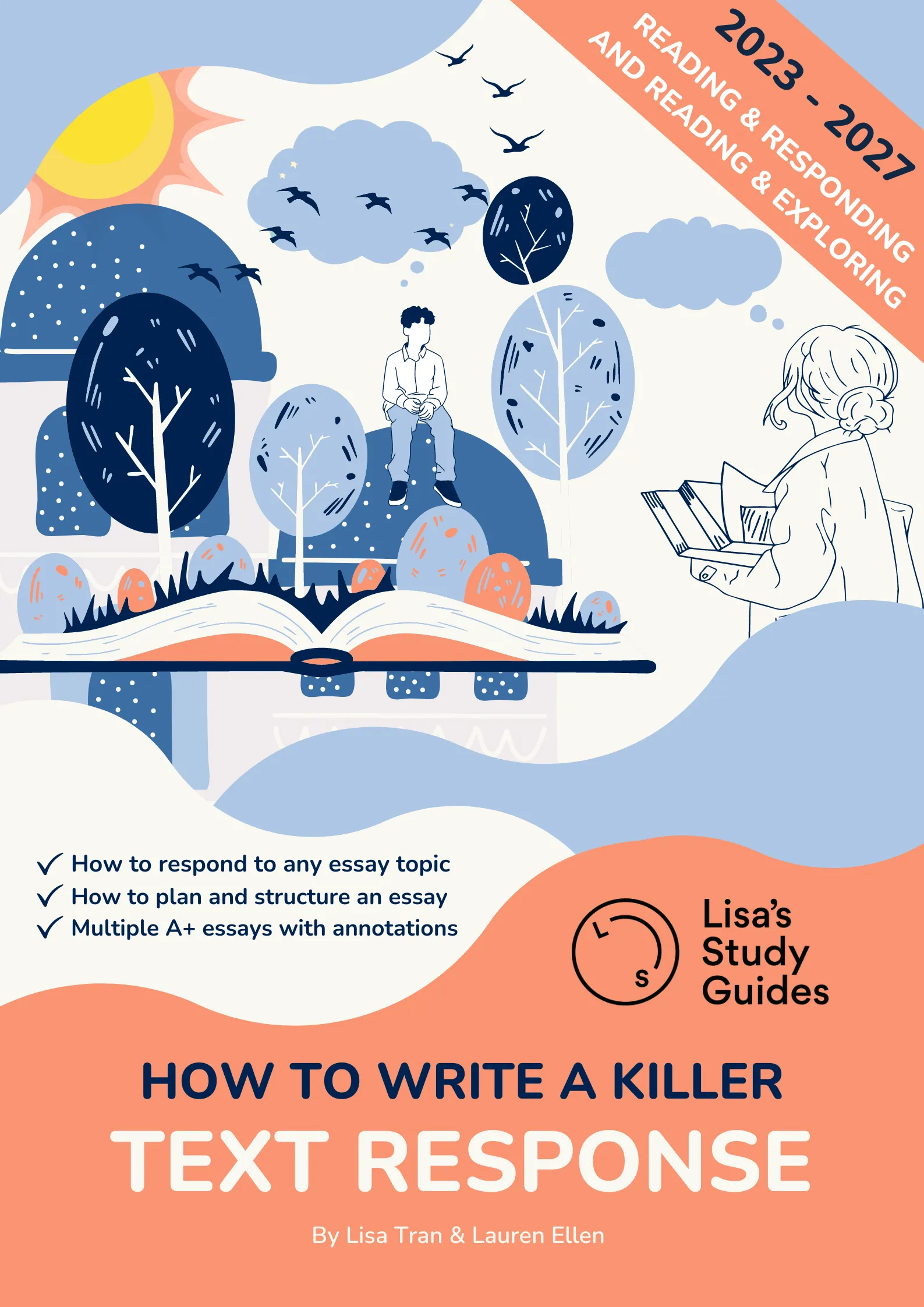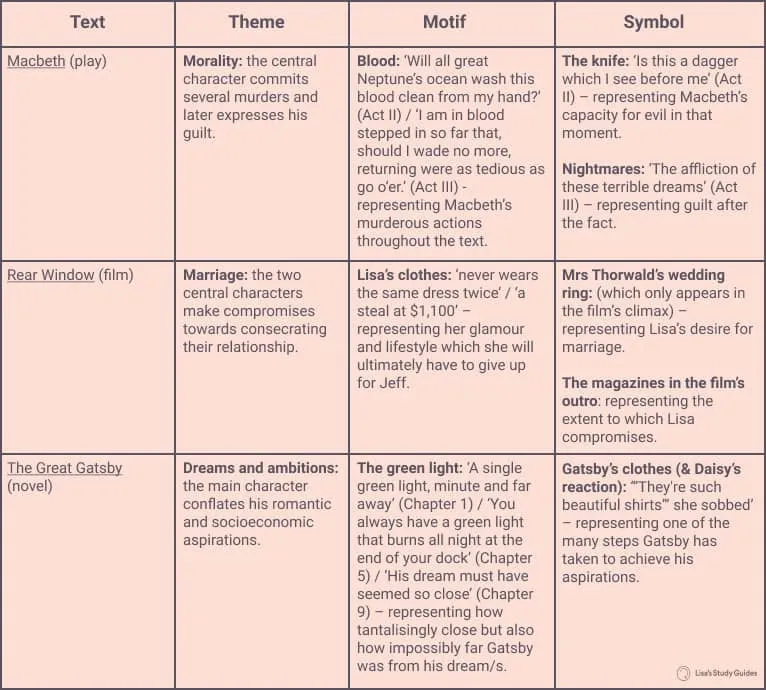David Malouf’s Ransom and Stephan Frears’ The Queen was a brand-new text pairing added to the study design in 2020. It is a unit with many nuances and intricacies to discuss, making it a perfect pairing to unpack in an essay topic breakdown!
For some context, backstory and a plot summary of both Ransom and The Queen, head to an earlier post Understanding Ransom and The Queen. This may help with your understanding of the essay prompt later in this post. And if you need a refresher on what the Comparative is, see our Ultimate Guide to VCE Comparative.
Overall, both Ransom and The Queen overlap fairly heavily in terms of key themes, ideas and messages. Even if you haven’t watched The Queen or read Ransom yourself, the essay topic I have chosen can give you an idea of how to seamlessly integrate such thematic overlaps and similarities into your own writing, whilst also acknowledging the differences in both texts.
Breaking Down the Prompt: THINK
Whenever you get a new essay topic, you can use LSG’s THINK and EXECUTE strategy, a technique to help you write better VCE essays. This essay topic breakdown will focus on the THINK part of the strategy. If you’re unfamiliar with this strategy, then check it out in How To Write A Killer Text Response.
Within the THINK strategy, we have 3 steps, or ABC. These ABC components are:
Step 1: Analyse
Step 2: Brainstorm
Step 3: Create a Plan
The Essay Prompt:
'it is true that the gods made me a king, but they also made me a man, and mortal.' – Priam (87-88)
'Your Majesty, there’s a last minute addition from Downing Street. They’re suggesting adding and as a grandmother here.' – Janvrin (Script, 87th Minute)
How do both texts explore the tensions that are created between a person’s public and private life?
THINK
Step 1: Analyse
This prompt is both a quote-based, and a how-based prompt (learn more about the five types of prompts here). This means that the examiner wants us to explain how the text creators (Frears and Malouf) convey tensions between one’s public and private life, using the quote to help us do so.
Step 2: Brainstorm
First, let’s break down the prompt part of the essay question. Here, the keywords are:
‘tensions’ - we have to focus on the contrast, and the hardships, that stem from the characters in both texts as they juggle their roles as leaders and individuals of their own accord. These difficulties are explored in more detail in an earlier LSG blog Ransom and The Queen.
‘public and private lives’ - invites us to consider the individuals in both texts, specifically leaders such as Queen Elizabeth and Priam, who have distinctly different public and private personas. Specifically, we want to focus on how the differences that arise between these two ‘lives’ suggest that compromises must be made in order for leaders to perform their role to its greatest potential.
Now it’s time to break down the quote itself!
Both the quotes from Ransom and The Queen illustrate points of tension in the lives of leaders.
Priam’s quote occurs toward the climax of Ransom. The examiner is directing you to discuss how being ‘a man’, and therefore seemingly unremarkable in nature, challenges Priam’s existence as a ‘king’, thus creating a point of tension in his reign.
Similarly, Janvrin’s quote also highlights how being a ‘grandmother’ is a role that must be performed by Queen Elizabeth in conjunction with her existence as the Queen of England. Yet, the inclusion of ‘Downing Street’ in this quote also moves you to consider how the queen’s own private affairs, such as Diana’s death, must be handled in conjunction with an outside team such as Tony Blair as British Prime Minister, thus entangling both her public and private personas.
Through both quotes, it is evident that when responding to how Frears and Malouf explore tensions in their respective texts, you should analyse the key characters of each text and their roles as both leaders and individuals in their own right.
I’ve grouped my ideas in a logical order so you can easily identify how each idea relates to my essay plan in Section C. During your own brainstorming, this will be difficult to achieve, so just keep in mind that you don’t need a logical layout of ideas until the planning stage!
- At the beginning of both texts, each protagonist fails to recognise and adequately perform their role as a ‘man’ and ‘grandmother’ respectively, due to their duties as a leader. This leaves them out-of-touch with the people around them, suggesting that being a leader can negatively impact one’s relationships with those they care about most.
- Priam refers to himself as ‘mortal’ in the prompt, revealing his own vulnerability. Furthermore, the inclusion of ‘Downing Street’ encourages discussion surrounding Tony Blair and his role as a public figure. In both cases, these men express their emotions to their people and those closest to them, leaving them open to backlash and criticism of their authority as leaders.
- For Queen Elizabeth, expressing her grief ‘as a grandmother’ allows her to connect emotionally to her people and regain their support, whilst for Priam, appearing to Achilles simply as ‘a man’ enables him to return to Troy both successful in his mission and respected by his people. This reveals that leaders should not let their public and private lives evoke tension, but rather should harness elements of each respective realm to build a modern, effective and relatable leadership style.
Step 3: Create a Plan
By dissecting the prompt’s keywords and briefly analysing the quote and its meaning, I have come up with three main points:
Paragraph 1: In both texts, Frears and Malouf suggest that in allowing themselves to be controlled by their public personas, leaders may struggle to connect with both their people and their own families
- Ransom: Somax is initially unable to connect with Priam due to his adherence to royal protocol and tradition
- The Queen: Queen is unable to provide emotional support to her grandsons following their mother’s death, due to her own stoicism and emotionally distant nature
Paragraph 2: Yet, in revealing an aspect of their personal lives, leaders risk compromising their public authority
- Ransom: When Priam breaks protocol and leaves the walls of Troy, the Trojan people question the strength and competence of their leader
- The Queen: Tony Blair’s unconventional style means he initially fails to gain respect from the Royal Family, despite being elected British Prime Minister
Paragraph 3: This delicate balance between one’s public and private lives is achieved most successfully when leaders reveal an element of their private selves and make themselves vulnerable and relatable to their people.
- Ransom: Priam recognises the importance of being a father as well as a leader, allowing him to bury Hector’s body whilst retaining respect and admiration from his people
- The Queen: By adopting Blair’s suggestions and addressing the British people in an honest, vulnerable way, Queen Elizabeth is able to regain their trust and respect.
EXECUTE
Essay
Stephen Frears’ film The Queen, set in contemporary England, and David Malouf’s novel Ransom, taking place in Ancient Greece, both explore the concept that one’s public identity can create tensions between their ceremonial constructed persona, and their own private identities. In both texts, Frears and Malouf (1) suggest that in allowing themselves to be controlled by their public personas, leaders may struggle to connect with their people, and their own families. Yet, in revealing an aspect of their own lives, they may also risk compromising their own public authority. This delicate balance between one’s public and private lives, therefore, is conveyed throughout Ransom and The Queen to be achieved most successfully when leaders reveal an element of their private lives and make themselves both vulnerable and relatable to their people, harnessing aspects of both their public and private lives in order to confidently perform their roles to the greatest extent possible. (2)
Annotations
(1) Make sure to refer to the author/director in your introduction and continually throughout your essay. This helps to ensure you are considering their purpose and its intended effect/message to the audience (see Views and Values for more on this).
(2) This is where I have included the broader implications of the topic – it will be my final paragraph where I somewhat challenge the prompt
In both Ransom and The Queen, leaders that allow themselves to be dictated by their public identities and subsequent rules, protocols and expectations, are portrayed to express difficulty in connecting with their constituents and their own families. In The Queen, Queen Elizabeth finds comfort in placing 'duty first, self second', as in performing in her role as a monarch for many years, she foregrounds such identity over her ability to connect personally with those around her. However, this struggle to formulate intimate connections is conveyed by Frears (3) to, at times, be at her detriment. Upon meeting the Royal Family, Cherie Blair, who symbolises the wider British society (4), describes that family as 'a bunch of free loading, emotionally retarded nutters'. This blunt description serves to indicate that in acting according to 'how [she] was brought up' and 'all [she’s] ever known', the queen compromises her public image and relatability to her people. In a similar manner, in Ransom, Somax describes only having 'seen King Priam at a distance…he is surprised at how old he looks', clearly illustrating the emotional and physical distance between the king and the people of Troy. Such distance is portrayed by Malouf to not only affect the way the people view their king, but also the manner in which Priam himself is able to formulate and express basic human emotions, as 'royal custom – the habit of averting his gaze', initially prevents him from connecting with Somax on a more intimate level. Through this, both Malouf and Frears highlight how, (5) in allowing themselves to be consumed by their roles as leaders, both Priam and Queen Elizabeth have sacrificed their ability to truly connect and engage with those around them, leaving them out-of-touch with the same people they govern. However, this lack of connection is also shown to extend to their families, as the queen is pictured by Frears to be physically disconnected with her own grandsons. Upon learning of Diana’s death, Prince Charles is depicted delivering the news to his sons, whilst the queen watches on from the corridor, as Frears uses a mid-shot with the door frame obstructing the audience’s view of Queen Elizabeth herself. This can be seen to symbolise (6) the ‘barricade’ between the queen and her own family, as her role as monarch separates her from those she loves. (7) In a similar manner, Priam’s only recollection of the birth of his son is 'recall[ing] a series of small squalling bundles', as his 'role…to hold myself apart in ceremonial stillness' directly prevents him from understanding, and becoming involved with his family, emotionally distancing himself from his own sons. Consequently, Frears and Malouf convey to their audience that the role of being a leader can negatively impact upon one’s relationship with others, serving as a constant burden and barrier to achieving intimate emotional connections.
Annotations
(3) In writing ‘conveyed by Frears’ as opposed to ‘conveyed’ I am trying to demonstrate that I am aware the film is a construction made by a director (in this case Frears) for a purpose – he is trying to communicate with the audience through the actions of his characters. See LSG’s Views and Values blog post or How To Write A Killer Text Response (the Views and Values section) for more on this.
(4) In this case, I am attempting to go ‘beyond’ what is simply portrayed in this scene and incorporate the setting of the text – in this case, highlighting my awareness of the time and place in which the film is set (i.e. context). While aimed at Literature students, this blog on context is helpful as it walks you through some contextual aspects you should consider.
(5) This is one of the main ways I would link my two ideas in Year 12, and draw ‘mini conclusion’ or a link (think of the TEEL structure) back to the topic. Yet, in beginning with ‘Malouf and Frears’, I am keeping the purpose of each text central to my link.
(6) When using film techniques, try to analyse their meaning. Rather than simply stating ‘Frears uses a mid-shot’, tell your assessor WHY he does this and what its intended effect is on the audience. This not only acts as a form of ‘textual evidence’ but also demonstrates your understanding of the text itself.
(7) In this sentence, I have tried to draw connections between the physical world and the author’s purpose in portraying the isolation of the British Royal family. Here, I’m referring to the ideas, views and values of the author/director.
On the other hand, however, in revealing one’s private life and expressing humility, leaders are also shown to risk their public authority. In Ransom, Priam becomes determined, following the death of Hector, to try 'something impossible. Something new' and allow for an element of vulnerability to be expressed, in order to successfully ransom his son’s body. Such an unusual, unconventional method of leadership, however, is depicted to take the people of Troy by surprise, as they witness their leader dressed 'in plain white' (8), stripped of his former royal gown. Therefore, the Trojans, who 'crowd the ramparts of the city' and 'line the walls of Troy' each day, in an attempt to view and 'cheer' their leader, 'do not know how to react' upon viewing Priam in such a common, ignoble state, reconsidering the way in which they regard and respect him. In a similar manner, in The Queen, Tony Blair is a Prime Minister whose ‘unconventional' style of leadership is seen to initially unnerve the Royal family. Upon being elected, Blair is described in a montage scene (9) to be a 'wonderful new Prime Minister…a compassionate young man…such a breath of fresh air', a different style of leader to previous Prime Ministers whom the queen previously worked with. The description of Blair as a 'compassionate young man' is significant as such compassion, combined with his youth, acts as a deterrent for the Royals in showing him respect as a leader, taken aback by his unusual views and values. Consequently, upon the death of Diana, although Blair attempts to advise Queen Elizabeth on behalf of the British People, Prince Phillip declares 'who does he think he’s talking to? You’re the sovereign. The head of state. You don’t get dictated to' clearly symbolising their lack of respect and willingness to consider Blair’s perspectives and ideas. In this way, Frears highlights how, in adopting an unconventional style of leadership, those in power may struggle to gain the respect of others around them, particularly their fellow leaders, with the Queen Mother’s statement of 'silly Mr Blair and his Cheshire cat grin' clearly portraying Tony Blair’s lack of authority within the Royal Family. Whilst, in Ransom, the people of Troy struggle to come to terms with Priam’s own change in his leadership style, wondering 'is the king deserting them?', those in The Queen are seen to accept Blair’s leadership style, evident through his 'landslide victory', as, unlike the people of Troy, they are seen to be open to a more progressive form of leadership. In both texts, however, Frears and Malouf demonstrate that leaders who illustrate an element of vulnerability, such as Priam and Tony Blair, may struggle asserting their authority over those with more traditional standards and views, such as the Trojan people and the Royal Family, and thus sacrifice an element of their public image and reputation.
Annotations
(8) This is a brief quote – these are useful to ‘replace’ your own words. It ensures you are remaining relevant in your analysis (aka not going off track!!) and acts as a way to ‘show off’ to your assessors that you know your text. However, as these quotes are so simple, I would rarely go into depth with my analysis of them – save this for your longer quotations.
(9) Although naming the scene as a ‘montage’ isn’t entirely necessary in this case, it shows the assessor that you remember where this scene takes place and gives a bit of context, further achieving that first criterion.
Yet, both David Malouf and Stephen Frears examine the notion that in revealing an element of their private life and making themselves vulnerable, a leader may be able to become more relevant, thereby easing the tension between their public and private personas (10). In The Queen, Queen Elizabeth’s adamant refusal to 'dance to their tune' and abide by the requests of her people leads her to proclaim 'I don’t think I have ever been hated like that', with Frears’ depiction of her crying outside Balmoral evident of her realisation that she needs to adapt to the 'change…shift in values' occurring among her constituents. This private expression of vulnerability by Elizabeth is the catalyst for her change in leadership style, with the setting of Balmoral itself, and subsequent events that take place there, symbolising the ability for leaders to harness an element of their personal lives and use it to adapt and connect with their people. In a similar manner, Priam’s declaration that coming to Achilles 'as a man of sorrow' gives him the 'chance to break free of the obligation of always being the hero' highlights Malouf’s view that, at times, leaders must 'break free' of the overwhelming 'obligation[s]' of their public life in order to achieve their objectives and desires within the private sphere. Priam’s realisation that the 'gods made me…mortal' (11) and subsequent appearance as 'a man of sorrow' allow him to successfully bury the body of his son, as he places his identity as 'a man' at the forefront. Priam’s ability to use his emotion in order to fulfil the desires of both him, as 'a father', and the wider people of Troy in allowing their most esteemed warrior to receive a proper burial, is mirrored in The Queen, where Queen Elizabeth adopts the use of emotion to regain the respect of British society. In returning from Balmoral, the queen directly interacts with the people outside Buckingham Palace, with Frears using a long shot to capture the extremely large numbers that had gathered outside the palace gates to emphasise the scale of public sorrow occurring. The queen’s interaction with her people, combined with her public address 'as a grandmother' (12), symbolises the way in which she was able to harness her identity both 'as your queen, and as a grandmother' to appeal to her people, gain their respect, and successfully lead them through an unprecedented, tumultuous event, thus easing the strain between her public and private personas. Likewise, Priam’s claim 'that the gods made me a king, but also made me a man' (13) highlights that he too has developed an understanding that in order to lead most successfully, one must express an element of vulnerability and humility, allowing for the people to emotionally connect and relate to those whom they admire. Therefore, both Malouf and Frears highlight that expressing elements of their private lives through their public identities is a method most effective in gaining leaders the respect and admiration they crave, as those they lead are able to find an element of commonality and relatability within such esteemed individuals.
Annotations
(10) Here is where I begin to go beyond simply the limitations or ‘obvious’ points made in the prompt and consider its wider implications. One strategy I used to help plan and write these paragraphs in Year 12 was to ask myself ‘Why is this a topic? What is the author/director trying to tell me as a member of the audience?’ It usually helps to closely consider the author’s purpose, thus ensuring you achieve a coherent and comprehensive analysis.
(11) Here, I am using part of the quote in the prompt to serve as evidence and back up my point regarding Priam’s combination of both his public and private identities. See How To Embed Quotes in Your Essay Like a Boss to learn how to seamlessly include quotes in your writing.
(12) It is here where I have used the quote from the prompt to influence my reasoning and my overall argument.
(13) Now I am moving on to explain the significance of the quote in the prompt.
Ultimately, both The Queen and Ransom explore the various tensions that can occur throughout the public and private lives of leaders, and their need to grapple with and understand such a concept in order to perform their duties most effectively. Whilst being constrained by one’s public persona may create emotional distance between an individual and those around them, in revealing an element of vulnerability, both texts illustrate that leaders risk losing respect and authority within public society. However, Frears and Malouf suggest that despite the difficult balance between one’s public and private lives, in order to lead most effectively, esteemed individuals should not allow each respective realm to create tension and unease, but rather harness elements of both their intimate and public personas in order to create a modern, effective and relatable leadership style (14).
Annotations
(14) My final sentence aims to focus on the ‘bigger picture’. Think of this as your ‘mic drop moment’ – you want to finish your essay with an overall statement that touches upon the author’s expressed or implied point of view. 5 Tips for a Mic-Drop Worth Essay Conclusion will help you nail your conclusion.
Throughout this essay, I have implemented the CONVERGENT and DIVERGENT strategy to help me discuss insightful points of similarity and difference. This is particularly important when it comes to essay writing, because you want to know that you're coming up with unique comparative points (compared to the rest of the Victorian cohort!). I don't discuss this strategy in detail here, but if you're interested, check out How To Write A Killer Comparative.
---
If you found this helpful and you’d like to dive deeper into this text pairing, see A Killer Comparative Guide: Ransom & The Queen. In this guide you'll learn unique points of comparison, we'll teach you how to think like a 45+ study scorer through advanced discussion on topics like literary and cinematic techniques, and we give you 5 A+ sample essay fully annotated!











.png)
.png)
.webp)
.png)





.jpg)